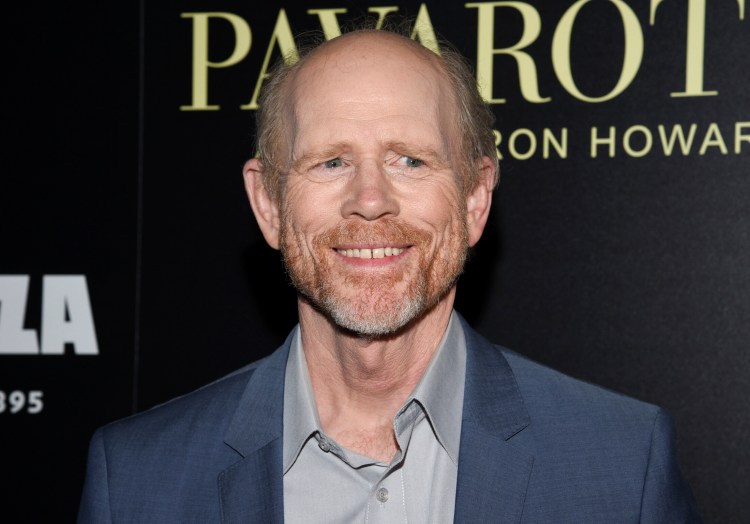LOS ANGELES — Ron Howard starts the interview to talk about his latest documentary film, “Pavarotti,” with an apology. He needs a moment because his daughter – Bryce Dallas Howard – is on the phone and she’s asking for his advice.
“She never asks for my advice,” Howard says after the short phone call ends.
This is Howard’s world. He’s juggling a life where he’s one of the most successful producers, directors and actors working in Hollywood while still finding time for his family. When it comes to work, his professional life has gone through a few changes in recent years.
Howard spent the majority of his time behind the camera during his post-Opie and “Happy Days” years creating scripted films. Whether it be a production like “Apollo 13” that was based on real events or a sword-and-fantasy saga like “Willow,” Howard had a script to use as his guide.
That changed in 2013 when Howard shifted into a documentarian mode for “Made In America” and continued with “The Beatles: Eight Days a Week – The Touring Years.” His latest documentary, “Pavarotti,” which will open in select theaters in early June, takes a look at Luciano Pavarotti, the man who became known as “The People’s Tenor.”

Director Ron Howard attends a special screening of “Pavarotti” at the iPic Theater in New York. Evan Agostini/Invision/AP
Considering his directing work with scripted projects massively outnumbers his documentaries, Howard laughs and calls himself “a layman” when it comes to the documentary film genre. That means he’s continuing to learn and investigate the process while offering in-depth looks at some very iconic subjects. One thing Howard has learned is that making a movie is not that wildly different whether you have a script or are making a documentary.
“A pleasant surprise for me was that so much of what I do as a narrative, scripted director, actually does carry over,” Howard says. “I am not staging actors and I’m not developing the script, but I am doing the same kind of research and exploring the subject.”
Whether he is making a movie like “The Da Vinci Code” or “Pavarotti,” the work starts with doing research. It is important for Howard to understand whatever world he is filming to make sure he creates the clearest story possible.
Howard uses interviews and never-before-seen footage to tell the story of Pavarotti as the world famous voice, family man and musical legend in a format that is like a three-act opera. It is a different approach than he used when making The Beatles documentary as that offering mixed the musical history of the Fab Four with personal recollections of those who saw them perform.
The biggest difference between the two ways of making films is that documentaries require a more fluid approach. Howard explains that the real thematic ideas in a documentary have to come from either the interviews that are done or the footage that is found. In a scripted world, those elements are already in place.
“With documentaries, you gather and then you have to sort of see what the material is saying to you,” Howard says. “You have your own set of ideas – some based on what you read in your research – but you have to ask yourself the question through the interviews and the archival footage we found of what can we really say versus what we think we would like to say.”
One of the attractions of doing a documentary like “Pavarotti” is that Howard is a big fan of character studies. Putting this film together gave him the chance to take a very deep and human look at a man that many considered a god in the world of opera. Howard – who describes himself as a timid introvert — smiles and admits that it was also an opportunity for him to learn about the opera world in the same way he learned about NASA when working on “Apollo 13” or the world of journalism with “The Paper.” That’s one of many reasons he finds more pleasure being behind the camera than working as an actor.
The film Howard ended up making on Pavarotti balances the glory of his music and the heat of his charisma with his private human struggles. It is a story of love, passion, joy, family, loss, risk and beauty told through the soundtrack of Pavarotti’s golden voice. The Oscar-winning director was especially taken with Pavarotti efforts to broaden the reach of his art as a way of exposing more people to opera. This was accomplished by Pavarotti through his global travels that included a trip to China.
“I also have a personal hope that our documentary might help continue that work. Luciano so loved music. He so loved people. And he wanted to bring the beauty of music to as many people around the world as he could,” Howard says.
“Pavarotti” is Howard’s latest effort to show the beauty and joy of cinema whether it is through documentaries or scripted efforts such as “Splash,” “A Beautiful Mind,” “Parenthood,” ‘Cocoon” and “Solo: A Star Wars Story.” He still manages to find some time to act, such as on the NBC series “This Is Us,” but Howard is staying busiest with work behind the camera.
He’s shown no preference between script films and documentaries as he is in pre-production on the film adaptation of the best-selling memoir “Hillbilly Elegy” and is also producing the documentary “Rebuilding Paradise” for National Geographic.
Send questions/comments to the editors.



Comments are no longer available on this story